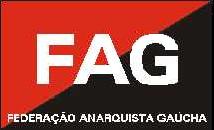FORUM OF ORGANIZED ANARCHISM 2003

|
FORUM OF ORGANIZED ANARCHISM 2003 |
|
FINAL DECLARATION OF THE 2nd FORUM OF ORGANIZED ANARCHISM 2003
Sao Paulo, Brazil
14 - 16 November 2003
This is an account of the discussions carried on in the workgroups during the 2nd FOA based on the agenda established during the preparatory plenaries. These texts were approved by consensus during the plenary of November 16.
CONCEPTION OF ORGANIZATION
In the discussions on the first point of the FOA agenda, it was pointed out that anarchism should organize itself politically and that, like propaganda, this organization is a means for political practice and not an end in itself. Programmatic unity is required in this organization, owing to the existence of differing conceptions of anarchism, something which could hinder the elaboration of strategies and compromise this unity.
Within that axis, it is important to point out the existence of two basic methods, one specifically anarchist and political, the other of social militancy, not necessarily anarchist.
On the political level, it was stressed that the organization needs to develop strategies, to elaborate a programme of action and propaganda whose aim is to encourage a revolutionary process to break with capitalism and build a libertarian socialist society. It is part of strategy to encourage the social movements towards a revolutionary direction, preserving the autonomy of the movement and not taking it over as most of the left does. The organization should reflect on its militants' involvement in the social movements, taking care that the winning of immediate demands does not fall into reformism and lose its revolutionary nature. During the discussions, the possibility was considered of an alliance on a political and social level with groups having different ideas.
ORGANIZATIONAL METHODS
Regarding the methods of anarchist organization, it was agreed that it is necessary to establish membership criteria at a political level: personal commitment; the development of social practices; a progressive increase in participation and responsibility; coherence in political action and education (presentation and discussion of the programme, documents and reference texts, all this accompanied by a militant). On a social level the criteria are more flexible and contextualized to the practice.
Regarding decisional methods, the search for consensus is a priority. When there is no consensus, the method used is the vote, but always noting the minority position for subsequent assessment, guaranteeing unity in action.
Regular meetings of the organization should take place - something that reflects on the organized nature of the group - and care should be taken to observe punctuality, frequency, agenda-writing and minute-taking, the delegation of tasks. As far as discipline is concerned, the following should be guaranteed: the carrying out of tasks, implementation of the group's policies, punctuality, collective responsibility; it is the responsibility of each group to decide how it will solve ethical and discipline problems.
An organization or group should have a financial policy with fixed individual dues and/or the production of material and events, and should maintain contact with other groups and establish security criteria.
The operations of an anarchist organization should be regulated through federalism, which uses direct democracy and delegation in the basic mechanisms of operation. Delegates defend the decisions of the group and not their individual considerations; therefore the mandate is momentary, revocable and should rotate in order to avoid overload and centralization (imperative mandate).
SOCIAL MILITANCY
Social militancy arises and is based in the society of classes - a consequence of the capitalist system - and should therefore: stimulate the development of class consciousness and of the struggle which exists between them; combat bourgeois ideology; promote popular participation in the process of rupture. This makes it possible to put political ideas into practice in pre-existing social bodies, to create other autonomously-regulated bodies, and to encourage the involvement of people and direct action, besides eventually establishing alliances with other actors in the social movement. Militants (including those who have opted to fight for the exploited classes in the present society, regardless of their origins) must not take on any centralizing function within the movement they take part in, and must ensure the real participation of the people. Because this participation stems from the population's real needs, militants' work must be centred on material demands without losing sight of the revolutionary project, and must seek to increase the level of class war on all fronts, thereby avoiding a fall into reformism.
Differently from activism, social militancy implies responsibility, regularity, constancy, self-discipline and an absence of separation between those who act in the social realm and those who act only at the political level. In order to better define their strategies for action and build their priorities for struggle, these militants should analyze the current situation, recognize their means and establish goals and priorities for the short term and medium term. Furthermore, they need to promote political education within the social militancy in order to complement practice and should, as far as possible, promote the anarchist view of concepts which have been disfigured by other ideologies such as liberty, social transformation, libertarian education, self-management, the masses, revolution, and so on.
In conclusion, all the workgroups during the FOA pointed to the need to give continuity to the debate, to create regional bodies that involve social and political practice activities, for which common agendas can be arranged.
The FOA affirms that anarchist practice is rooted in the class struggle as a revolutionary practice.
ANARCHISM IS STRUGGLE!!!!
Organizations present at the FOA Plenary: Luta Libertária (Sao Paulo), União Popular (Goiânia, Goiás), Federação Anarquista Gaúcha (Rio Grande do Sul), Federação Anarquista Insurreição (Rio de Janeiro), Rede Libertária da Baixada Santista (Santos, Sao Paulo), AR-S26 (Mogi das Cruzes, Sao Paulo), RNT-1936 (Guarulhos, Sao Paulo), CRL (Sao Paulo), TEAR (Sao Paulo), Utopia Socialista (Sao Paulo), GARRA (Sao Paulo), CCMA (Sao Paulo), CELMA (Sao Paulo) and various individuals.